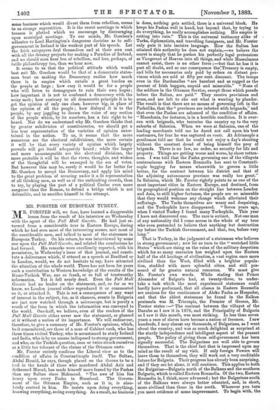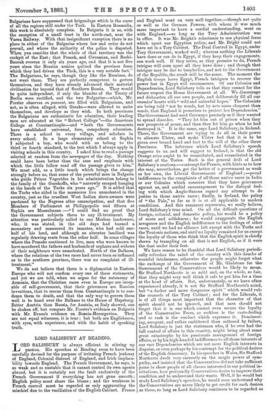MR. FORSTER ON EUROPEAN TURKEY.
MR. FORSTER will, we fear, have learned a disagreeable lesson from the result of his interview on Wednesday with the agent of the Pall Mall Gazette. He had just re- turned from a considerable tour in Eastern Europe, during which he had seen most of the interesting scenes, met most of the considerable men, and talked to most of the statesmen in European Turkey. On his return, he was interviewed by some one upon the Pall Mall Gazette, and related the conclusions he had formed. His remarks were excellently reported, with his permission, in Wednesday's issue of that journal, and consti- tute a deliverance which, if uttered as a speech at Bradford or in London, would, we do not hesitate to say, have attracted the attention of the whole world. There has not been for years such a contribution to Western knowledge of the results of the Russo-Turkish War, one so frank, or so full of trustworthy information. Yet it fell nearly dead. Even the Pall Mall Gazette had no leader on the statement, and, so far as we know, no London journal either reproduced it or commented on it, or attacked it. This is not a consequence of any want of interest in the subject, for, as it chances, events in Bulgaria are just now watched through a microscope, but is purely a result of the form in which the information was conveyed to the world. One-half, we believe, even of the readers of the Pall Mall Gazette either never saw the statement, or glanced at it without a notion of its importance. We will endeavour, therefore, to give a summary of Mr. Forster's opinions, which, be it remembered, are those of a man of Cabinet rank, who has three times visited Turkey, who is accustomed to study Ireland and India, who is by no means indisposed to strong government, and who, on the Turkish question, once or twice struck ourselves as a little too tolerant of the claims of the Ottoman caste.
Mr. Forster entirely confirms the Liberal view as to the condition of affairs in Constantinople itself. The Sultan, Abdul Hamid, he says, though placed on the throne to be a tool in the hands of those who murdered Abdul Aziz and dethroned Murad, has made himself more feared by the Pashas than any Sultan since Mahmoud. "The awe of him lies heavy upon every Pasha in Stamboul. The Govern- ment of the Ottoman Empire, such as it is, is abso- lutely centred in him. He insists upon doing everything, knowing everything, seeing everything. As a result, no business is done, nothing gets settled, there is a universal block. He keeps his Pashas well in hand, but beyond that, by trying to do everything, he really accomplishes nothing. His empire is rotting into ruin." This is the universal testimony alike of Turks, diplomatists, and travelling foreigners, and Mr. Forster only puts it into incisive language. How the Sultan has attained this authority he does not explain,—we believe the secret is simply that he pushes his perfectly legal pretensions as Vicegerent of Heaven into all things, and while Musulmano cannot resist, there is no other force ;—but that he has it is past all doubt, and as one consequence the'. Treasury is empty, and bills for necessaries only paid by orders on distant pro- vinces which are sold at fifty per cent. discount. The troops even in the Dardanelles " are barefoot and as ragged as the poorest of Irish beggars, unpaid and miserable." " None of the soldiers in the Ottoman Service, except those which parade before the Sultan, are paid." They receive provisions and arms, and are left to eke out what is wanting by plunder. The result is that there are no means of governing left in the Pashaliks, that the " provinces are infested with brigands," and that even the Pashas are ashamed of the condition of affairs. " Macedonia, for instance, is in a horrible condition. It is over- run with brigands, who terrorise the country up to the very suburbs of Salonica. When we were at Salonica, one of the leading merchants told me he dared not call upon his best customers, for fear he was captured en route. At Adrianople a gentleman told me that he could not enjoy a day's shooting without the constant dread of being himself the prey of brigands. There is no law, no order, no security for life and property. Things are getting worse and worse, by sheer rotten- ness. I was told that the Pasha governing one of the villayets conterminous with Eastern Ronmelia has sent to Constanti- nople begging for means wherewith to govern a little better, for the contrast between his district and that of the adjoining autonomous province was really too great." In Salonica, which Mr. Forster rightly points to as one of the most important cities in Eastern Europe, and destined, from its geographical position on the straight line between London and Asia, to still higher fortunes, the people are so miserable that they would welcome any change which alleviated their sufferings. The Turks themselves are weary and despairing, and the Turkophils have disappeared. " Seven years ago, when I visited Turkey I found many Turkophils. This year I have not discovered one. The race is extinct. Not one man of any nationality did I come across in the whole of my tour who even pretended to believe that anything but destruction lay before the Turkish Government, and that, too, before very long."
That is Turkey, in the judgment of a statesman who believes in strong government ; now let us turn to the " wretched little States " which are rising on the ruins of the military despotism which for so many centuries has weighed upon the Eastern half of the old heritage of civilisation, a vast region once more civilised than the West, filled with a brighter popula- tion, studded with more splendid cities, and still pos- sessed of far greater natural resources. We must give Mr. Forster's own words. While stating that Prince Alexander of Bulgaria had, at twenty-three, to under- take a task which the most experienced statesman could hardly have performed, that all classes in Eastern Roumelia are anxious for the continuance of Aleko Pasha as Hospodar, and that the ablest statesman he found in the Balkan peninsula was M. Tricoupis, the Premier of Greece, Mr. Forster states :—" The contrast between the villayet of the Danube as I saw it in 1876, and the Principality of Bulgaria as I saw it this month, was most striking. In less than seven years a race of slaves have become a nation of freemen. I saw hundreds, I may almost say thousands, of Bulgarians, as I went about the country, and was as much delighted as surprised at the sturdy independence and intelligent aspect of the peasant people. The policy of giving them self-government has been signally successful. The Bulgarians are well able to govern themselves. That is the chief fact that is impressed upon my mind as the result of my visit. If only foreign Powers will leave them to themselves, they will work out a very creditable future for Bulgaria. Their progress has already been surprising, and if they are let alone, it will continue. This applies to both the Bulgarias—Bulgaria north of the Balkans and the southern Bulgaria, which is called Eastern Roumelia. Of the two, Eastern Roumelia is, I think, more advanced ; but the Bulgarians south of the Balkans were always better educated, and, in short, more civilised than those in the north. Wherever you turn you meet evidence of some improvement. To begin with, the Bulgarians have suppressed that brigandage which is the curse of all the regions still under the Turk. In Eastern Bournelia, this work is absolutely complete. In Bulgaria it is so, with the exception of a small tract in the north-east, near the Varna Railway. With that insignificant exception there is no place in either of the Bulgarias where law and order do not prevail, and where the authority of the police is disputed. When you consider that the whole of that territory was the cockpit of the East ; that Pomak, and Circassian, and Bashi- Bazonk overran it only six years ago, and that it is not five years since the Russian armies quitted the province from which they had driven the Turk, this is a very notable fact." The Bulgarians, he says, though they like the Russians, do not want them. They are perfectly . competent to govern themselves, and they have already advanced their material civilisation far beyond that of Southern Russia. They would be quite independent, if only the blunder of the Treaty of Berlin were rectified, and the two Bulgarias—which, Mr. Forster observes en passant, are filled with Bulgarians, and not, as is often alleged, with Greeks—were allowed to unite themselves, and develope as they wish. In both provinces the Bulgarians are enthusiastic for education, their leading men are educated at the " Robert College "—the American College at Constantinople—and " both the Governments have established universal, free, compulsory education. There is a school in every village, and scholars in every school. In a large elementary school at Sophia I subjected a boy, who would with us belong to the third or fourth standard, to the test which I always apply in visiting schools in this country. I asked him to read a passage selected at random from the newspaper of the day. Nothing could have been better than the ease and emphasis with which the little fellow read off the passage given to him." We must add, as a little touch which brings the change strongly before us, that some of the powerful men in Bulgaria who guide Prince Vogorides in his administration belong to the family of the Gueshoffs, who " narrowly escaped hanging at the hands of the Turks six years ago." It is added that the Turks who aided in the massacres live unmolested in the country, just as the cruellest West Indian slave-owners were pardoned by the Negroes after emancipation, and that five Members of Parliament at Philippopolis and fifteen at Sophia are Mussulmans :—" I could find no proof that the Government subjects them to any ill-treatment. My attention was particularly called to one Moslem landowner, who, it was stated, in the old days had burned a monastery and massacred its inmates, who had sold one- half of his land, and although an absentee landlord was regularly drawing rents from the other half. In some villages where the Pomaks continued to live, men who were known to have murdered the fathers and husbands of orphans and widows of their neighbours were unmolested. North of the Balkans, where the relations of the two races had never been so inflamed as in the southern province, there was no complaint of ill- treatment."
We do not believe that there is a diplomatist in Eastern Europe who will not confirm every one of these statements, and yet we are told, when we argue for the autonomy of Armenia, that the Christian races even in Europe are incap- able of self-government, that their grievances are Russian inventions, that to rescue them from Constantinople is to con- demn them to death, and that the only way to govern them well is to hand over the Balkans to the House of Hapsburg. Better Austria than Russia, for Austria, as Italy showed, can be shaken off, but compare Mr. Forster's evidence on Bulgaria with Mr. Evans's evidence on Bosnia-Herzegovina. They are not equal witnesses, it is true ; but both are Englishmen, with eyes, with experience, and with the habit of speaking truth.







































 Previous page
Previous page